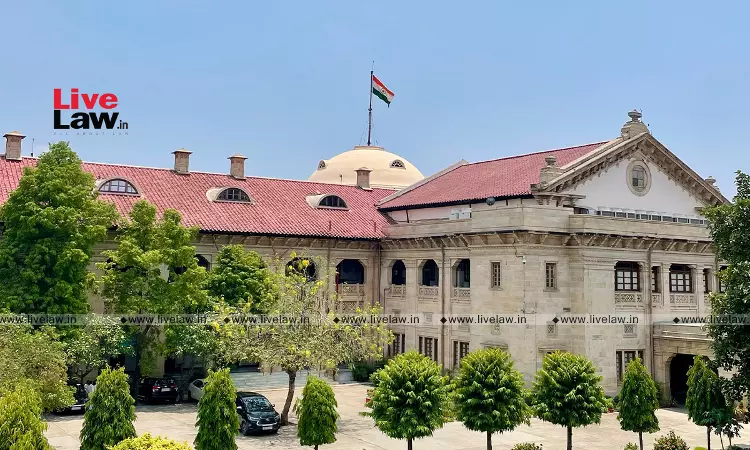- Home
- /
- High Courts
- /
- Allahabad High Court
- /
- 'Saptapadi' Ceremony Is An...
'Saptapadi' Ceremony Is An Essential Ingredient To Constitute A Valid Hindu Marriage: Allahabad High Court
Sparsh Upadhyay
3 May 2024 8:03 AM GMT
The Allahabad High Court recently observed that the Saptapadi ceremony ((taking of seven steps by the bridegroom and the bride jointly before the sacred fire)) is one of the essential ingredients of a valid marriage under Hindu law. With this, the bench of Justice Gautam Chowdhary allowed a petition filed by one Nisha challenging the summoning order and further proceedings in a case...
The Allahabad High Court recently observed that the Saptapadi ceremony ((taking of seven steps by the bridegroom and the bride jointly before the sacred fire)) is one of the essential ingredients of a valid marriage under Hindu law.
With this, the bench of Justice Gautam Chowdhary allowed a petition filed by one Nisha challenging the summoning order and further proceedings in a case under Sections 494 (Bigamy) IPC.
The case in brief
Essentially, in December 2022, the opposite party No. 2 (husband) filed a complaint case against the present revisionist (wife), alleging that she had earlier solemnized marriage with another person, and thereafter, without obtaining any decree of divorce from any court of law, she solemnized marriage with him in Arya Samaj Mandir according to Hindu rites and rituals.
The husband further claimed that when he learned about his wife's previous marriage, he asked the revisionist about it. Then, she threatened him for implicating him in false cases and demanded ten lakh rupees.
After recording statements of the complainant-husband and witnesses under Sections 200 & 202 CrPC in the complaint, the Court summoned the revisionist-wife for the offence under Sections 494, 504, and 506 IPC. Challenging the same, she moved to the High Court.
At the outset, the Court noted that to make out an offence of bigamy under Section 494 IPC, the following ingredients should be established by the prosecution.
- That the accused was already married to some person; proof of actual marriage is always necessary;
- That the husband or wife to whom the person was married as the case may be, was alive on the date of the second marriage and proof thereto satisfactory to the Court must be adduced;
- That the accused married another person proof of celebration of second marriage must be in the same manner as that of the first; and
- That the second marriage was void by reason of its taking place during the lifetime of the first spouse.
The Court also observed that, as per Section 7 of the Hindu Marriage Act, 1955, a Hindu marriage may be solemnised in accordance with the customary rites and ceremonies of either party thereto.
The Court further noted that where such rites and ceremonies include the saptapadi, the marriage becomes complete and binding when the seventh step is taken.
Additionally, the Court noted that the word "solemnize," concerning marriage, entails celebrating it with proper ceremonies and in due form. Therefore, the Court emphasised that a marriage lacking these elements cannot be considered "solemnized."
Against this backdrop, referring to the mandate of Section 494 IPC, the Court said that the second marriage should have been celebrated with proper ceremonies and in due form. Therefore, in the case of a Hindu marriage, unless the 'Saptapadi' ceremony is performed, a valid marriage cannot be said to be constituted.
In view of this, the Court observed that in the absence of cogent evidence in this regard, it was difficult to hold that the 'Saptapadi ceremony' of the marriage, as contended by the complainant, was performed to constitute a valid marriage between the parties concerned.
“As such, on taking into consideration the contents of the complaint on its face value, the basic ingredients to constitute an offence under Section 494 of I.P.C. are lacking; hence, no offence under Section 494 I.P.C. is made out against the revisionist,” the Court held.
Consequently, the Court partly allowed the petition and quashed the impugned summoning order and further proceedings in the complaint so far as it related to the provisions under Section 494 IPC.
However, so far as the criminal proceeding initiated against the revisionist in other provisions, i.e., under Sections 504, 506 I.P.C. is concerned, the Court said that the same shall go on.
In related news, the Supreme Court recently clarified the legal requirements and sanctity of Hindu marriages under the Hindu Marriage Act 1955.
The Court emphasized that for a Hindu marriage to be valid, it must be performed with the appropriate rites and ceremonies, such as saptapadi (seven steps around the sacred fire) if included. Proof of these ceremonies is essential in case of disputes.
Appearances
Counsel for Revisionist: Diwakar Mishra, Gaurav Kumar Srivastava, Mohd Afroz Khan
Counsel for Opposite Party: Baleshwar Dayal, G.A., Mayank Prakash Rawat
Case title - Nisha vs. State of U.P. and Another 2024 LiveLaw (AB) 283
Case Citation: 2024 LiveLaw (AB) 283


